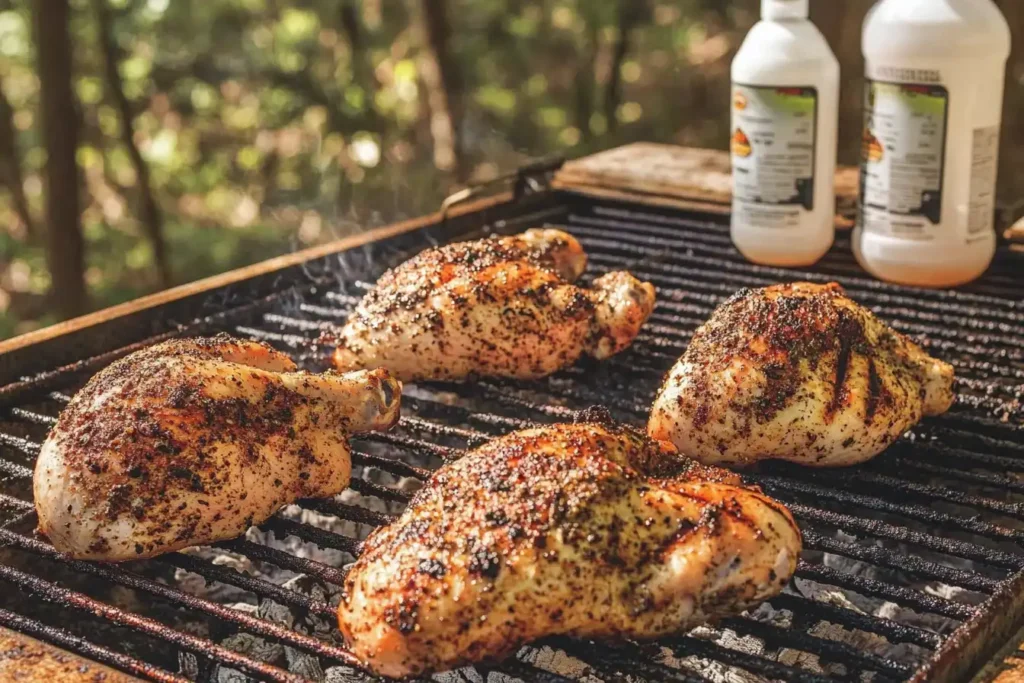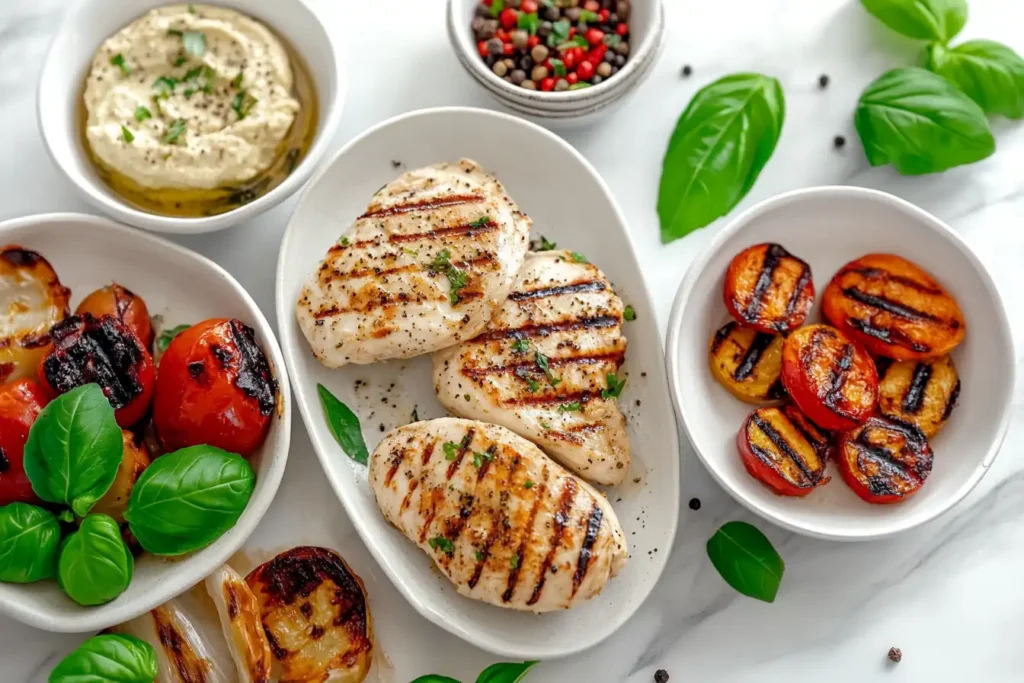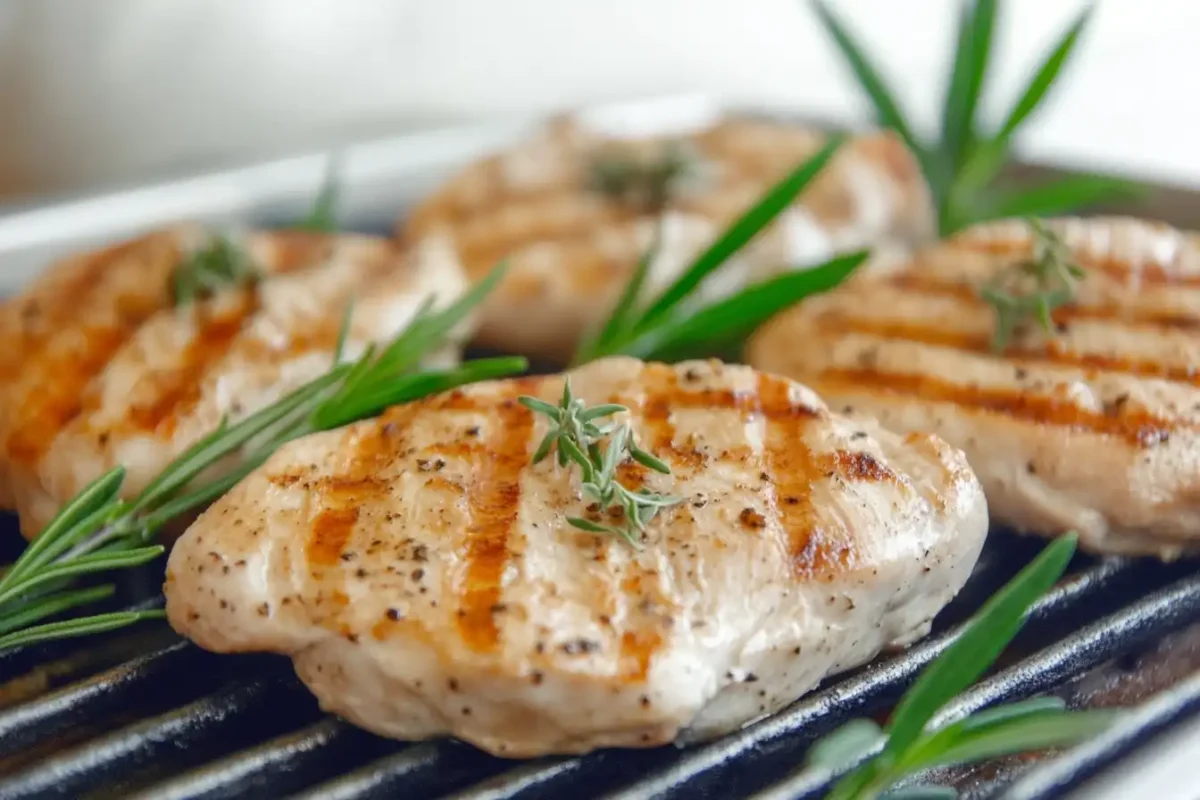Achieve perfectly grilled chicken every time with these expert tips, from marinades to cooking techniques.
Achieving perfectly grilled chicken can be a culinary triumph, but dryness often plagues even the most seasoned home cooks. The question, how do you grill chicken on the grill without drying it out, is a common one, and the answer involves mastering several key techniques. In this comprehensive guide, we will explore essential methods, from marinade secrets and temperature management to best practices for preventing dryness. By following these steps, you’ll be able to consistently grill chicken that is tender, juicy, and delicious, leaving behind the frustration of dry, overcooked meat.
Why Chicken Dries Out on the Grill
Chicken, especially chicken breasts, can dry out quickly. High heat, if uncontrolled, zaps the moisture inside. However, understanding how protein reacts to direct flames helps you avoid this common pitfall.
Comparatively, beef or pork has more fat, which naturally retains moisture. Chicken is much leaner, so it benefits from additional care. Basically, the key is watching heat and timing.
Furthermore, the internal temperature of chicken must reach at least 165°F (74°C) to be safe to eat. Chiefly, overcooking past that point increases dryness. Hence, using a thermometer and controlling the grill heat is critical.
Additionally, marinades or brines help keep moisture inside the meat. Because they penetrate the muscle fibers, they add flavor and juiciness. Nevertheless, even the best marinades cannot fix careless grilling.
Essential Tools and Preparations
Grilling is easier when you have the right tools. Initially, choose a reliable grill, whether gas, charcoal, or pellet. Make sure it can reach stable temperatures. Moreover, a quality meat thermometer is indispensable to check when your chicken has reached the ideal internal temperature.
Equally, proper grill grates help with even heating. Clean grates prevent sticking and ensure nice grill marks. Another helpful tip is to keep a spray bottle of water nearby in case of flare-ups.
Safe handling is also important. Undoubtedly, always store raw chicken in the refrigerator until you are ready to grill. Comparatively, keep your tools sanitized. A separate cutting board for raw meat reduces cross-contamination. Eventually, these steps protect you from foodborne illness and produce safer, tastier results.
How do you grill chicken on the grill without drying it out?
Many home cooks ask, how do you grill chicken on the grill without drying it out? The short answer is: prepare carefully, grill with precision, and watch the internal temperature. The following steps highlight marinade essentials, correct cuts, and how to use a thermometer for perfect outcomes.
How do you grill chicken on the grill without drying it out?
Marinades pack flavor and moisture. Eventually, a simple marinade includes oil, an acid (like lemon juice), and spices. For example, you can mix olive oil, lime juice, garlic, salt, and pepper for a zesty profile. Afterward, soak your chicken in the mixture for at least 30 minutes, or up to overnight for maximum impact.
Comparatively, sweet marinades containing sugar or honey can burn quickly on the grill. Therefore, watch your heat or add sweet glazes late in the grilling process. Likewise, adding a pinch of salt in the marinade enhances moisture retention.
Choosing the Right Chicken Cut
Chicken breasts are the most popular cut, yet they are prone to dryness. Consequently, consider chicken thighs or drumsticks. These cuts have more fat, which keeps them moist. Particularly, bone-in and skin-on varieties retain more flavor.
If you love chicken breasts, pound them to an even thickness. Altogether, this ensures each piece cooks evenly. Conversely, uneven cuts will have dry edges or undercooked centers. Notably, a little prep work goes a long way.
Using a Meat Thermometer Effectively
A meat thermometer is the best way to guarantee safety and juiciness. Specifically, insert it into the thickest part of the chicken. The target is 165°F (74°C). Meanwhile, avoid pressing or cutting the chicken to check doneness, as it lets precious juices escape.
Eventually, practice checking the temperature early and often. Indeed, it’s better to check more frequently than to guess. Hence, you can prevent overcooking by removing the chicken from the grill right when it hits the mark.
Techniques for Juicy Results

There are many techniques that keep chicken juicy. Generally, the two main methods involve direct and indirect heat. Conversely, using direct heat cooks the outside quickly, while indirect heat allows the inside to cook more slowly.
- Direct Heat: Grill the chicken directly over the heat source. This is great for thinner cuts or when you want a nice sear.
- Indirect Heat: Place the chicken away from the flames. Close the lid to create an oven-like environment. This approach is perfect for thicker pieces or bone-in chicken.
Subsequently, basting adds moisture and flavor. You can use a simple oil-based mixture or a special sauce. However, apply sauces with sugar or fruit-based ingredients at the end to avoid scorching. Nonetheless, lightly brush the chicken during grilling to keep it from drying out.
Resting is also crucial. Typically, allow the chicken to sit for about five minutes after removing it from the grill. Altogether, resting redistributes the juices, making each bite tender.
How do you grill chicken on the grill without drying it out?
People often wonder, how do you grill chicken on the grill without drying it out? The trick lies in balancing heat exposure, flipping techniques, and additional steps like brining. Focus on consistent grill marks for a professional look, but don’t forget to protect your chicken from dryness.
How do you grill chicken on the grill without drying it out?
Perfect grill marks add both flavor and presentation. First, make sure your grill grates are clean and well-oiled. Then, place the chicken on the grill at a 45-degree angle for a short time. Afterward, rotate it 45 degrees in the opposite direction to form diamond-shaped marks.
Especially, timing matters. Keep the chicken in each position for one to two minutes, depending on thickness. Nevertheless, watch for flare-ups. Hence, you may need to move the pieces around if the heat becomes excessive.
Smart Flipping and Rotating
Flipping at the right moment is vital for juiciness. Until you see grill marks forming and the chicken releases easily, avoid moving it. Usually, flipping too soon can tear the surface and cause dryness.
Additionally, rotate the pieces so each side gets equal heat distribution. Furthermore, any hot spots on the grill can cause uneven cooking. Therefore, if certain areas are hotter, shift the chicken around to balance the cooking process.
The Brining Approach
A simple brine dissolves salt in water and helps chicken stay moist. Initially, soak the chicken in a salt solution for at least 30 minutes or overnight. Basically, salt dissolves proteins, allowing them to retain more water.
Likewise, add herbs or spices to the brine for extra flavor. Altogether, brining is especially effective for lean cuts like breasts. Consequently, you end up with juicier, more flavorful results.
Seasoning and Flavor Combinations
Seasoning can turn plain grilled chicken into a gourmet delight. Subsequently, explore different flavor profiles. Comparatively, a basic salt-and-pepper rub complements many sauces or sides.
- Dry Rubs: Combine paprika, garlic powder, onion powder, salt, pepper, and a dash of cayenne. Hence, you achieve a well-rounded taste.
- Sauces: Barbecue sauce or teriyaki glaze add sweet and tangy notes. Meanwhile, keep a close eye on the heat to prevent burning.
- Herbs and Spices: Rosemary, thyme, or oregano pair nicely with citrus-based marinades. Particularly, fresh herbs infuse subtle flavors when added at the end.
Eventually, get creative and mix cultural influences. For example, use cumin, chili, and lime juice for a Mexican twist. Unquestionably, well-balanced seasoning ensures that each bite bursts with flavor.
How do you grill chicken on the grill without drying it out?
You might still be thinking, how do you grill chicken on the grill without drying it out? Certain mistakes often lead to dryness, but there are straightforward ways to avoid them. Monitor grill temperature, make adjustments, and troubleshoot as needed.
How do you grill chicken on the grill without drying it out?
Chiefly, one of the biggest mistakes is cooking chicken at excessively high heat for too long. Eventually, the outside burns before the interior finishes cooking. Likewise, never skip the resting period. If you cut too soon, juices spill out.
Furthermore, forgetting to season properly also leads to bland, dry meat. Altogether, marinade and brine solutions are powerful allies. Hence, use them wisely.
Adjusting the Grill Temperature Mid-Cook
Sometimes the grill gets hotter or cooler than expected. Consequently, keep an eye on the built-in thermometer (if available). Subsequently, adjust vents on a charcoal grill or lower the burner on a gas grill to manage heat.
Meanwhile, move chicken pieces to the cooler side if they are browning too quickly. Particularly, thick cuts benefit from longer cook times at lower heat. Finally, patience pays off with tender, juicy meat.
Troubleshooting Dryness
If your chicken still ends up dry, don’t lose hope. Altogether, next time, marinate or brine for longer. Equally, reduce the grill temperature slightly or shorten cooking time. Eventually, practice makes perfect.
Moreover, try using bone-in, skin-on chicken for a safety net of moisture. Specifically, the skin locks in natural juices. Nevertheless, remove the skin afterward if you prefer a leaner meal.
Serving and Presentation

Presentation matters almost as much as taste. Basically, place your grilled chicken on a platter, garnish with fresh herbs, and serve with colorful sides. Subsequently, grilled vegetables like zucchini or bell peppers add nutrition and variety.
Additionally, consider pairing with light salads or creamy coleslaw for contrast. Indeed, bright sauces like chimichurri or salsa verde liven up the plate. Hence, you transform your grilled chicken into a feast for the eyes and taste buds.
For storage, let leftovers cool, then refrigerate in airtight containers. Particularly, consume within three to four days. Conversely, you can freeze cooked chicken for up to three months. Finally, reheat gently in an oven or microwave to prevent further dryness.
Conclusion
You have explored every angle on how do you grill chicken on the grill without drying it out. Altogether, the keys include properly marinating or brining, controlling grill temperature, and employing a meat thermometer. Eventually, rest the chicken and use tried-and-true flipping strategies. Unquestionably, these steps lead to succulent, tender chicken every time.
Moreover, do not hesitate to experiment with seasonings or cooking methods. Consequently, you might discover a new family favorite. Ultimately, with practice and attention to detail, dryness becomes a thing of the past.
Frequently Asked Questions (FAQs)
How to keep chicken moist while grilling?
Marinate or brine your chicken before grilling. Undoubtedly, these methods help the meat retain moisture during high-heat cooking.
How to stop grilled chicken from drying out?
Use moderate heat and a thermometer. Furthermore, aim for an internal temperature of 165°F (74°C). Overcooking is the main culprit behind dryness.
Why does my grilled chicken come out dry?
Excessive heat, lack of marinade, or not using a thermometer can cause dryness. Additionally, skipping the resting step drains out the juices.
What not to do when grilling chicken?
Avoid applying sweet sauces too soon, flipping too frequently, or cooking at extreme temperatures. Likewise, don’t cut into the chicken too early, as it releases valuable juices.
FOR MORE DELICIOUS RECIPES:
Grilled Chicken Margherita Magic

